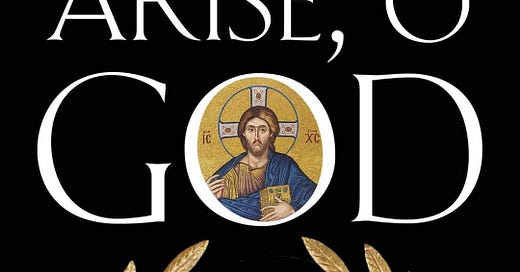I’d like to share some of the most fascinating and thought provoking ideas brought forth in this conversation between Jonathan Pageau (one of the finest Christian thinkers of our time according to Jordan Peterson) and Orthodox archpriest and Lord of the Spirits podcast host Fr. Andrew Damick on his recent book - Arise O God: A cosmic vision of the Gospel. Below are my notes on their conversation about defining the gospel in the context of early church and the pagan world:
The popular understanding of the people in the English speaking world about the Gospel is something very individualistic. Like for example - what can Jesus do for me? How can Jesus make my life better? How can I be saved from hell? While it is true there are some elements of it that can be derived from the bible, but if we put gospel in those terms, it just appears as fixing problems in one’s life. And if that is how one understands the gospel and then goes onto communicate this view of gospel to others, it comes across as a sales pitch - “You have a problem, you have a lack in your life and I have the answer to fix it”.
This sales pitch style of gospel presentation is nowhere to be found in Matthew, Mark, Luke, John and Acts of Apostles used by Jesus or his apostles, but rather the presentation is that of a declaration, an announcement, a proclamation, a broadcasting of something that is happening or happened. The manner, the delivery and the contents of the gospel presentation of Jesus and his apostles is different to how it is done in modern day churches. It is important to understand the distinction here between proclamation vs sales pitch style of presentation, this is because Gospel is good news and not good advice.
Euangelion, the greek word translated as good news or gospel in the ancient world refers to the announcement of something that is happening or happened. The idea is that of an announcement of the victory of an emperor vanquishing his enemies and how the population would gain the benefit of it by having peace in the land because of the defeat of their enemies.
Euangelia, the plural word in the ancient world denotes a herald / messenger riding into a city, opening up his scroll and announcing three things usually:
This is the lord whom I serve (typically a Caesar like figure)
This is who my lord is (listing Caesar’s titles)
This is what my lord has accomplished (listing Caesar’s victories in battle)
And now as a result of this announcement this is what my lord (i.e. Caesar) expects of the people as he takes over the land, there are two options:
You can get on board with his rule or
You can be put outside his rule (in the Roman world it largely meant you are going to be slaughtered).
When the Apostles uses this word Euangelion, they are saying the same thing as a herald would in the Roman world (because time frame of Christianity was in the context of the Roman empire). The apostles when proclaiming the gospel are saying the following:
They are identifying who their Lord is (Jesus Christ)
They are saying what Jesus Christ has done (He has defeated his enemies – sin, devil and death)
They are saying what Jesus Christ expects of the listeners of this proclamation (to be part of His kingdom or not).
The Orthodox view of the gospel is the declaration of victory of Jesus Christ and about participating in His resurrected life. All authority in Heaven and on earth has been given to Jesus Christ, who has taken his throne by defeating the enemy of all of creation, which is death. This view is popularly known as Christus Victor model which means Christ is victorious. But sometimes this circle of understanding is not extended out very far, it is only extended to Christ is victorious over the problems of my life (which is true), but it is a narrow understanding of the work of Christ. If it is an announcement of the victory of Christ over his enemies then you have to know who his enemies are.
Continued in part 2…




